Voting Rights Act of 1965

A DIFFICULT TRUTH: The United States has never fully lived up to the ideals in its founding documents. Throughout our history, our country’s fate has always been bitterly contested. Will we privilege whiteness, maleness, straightness, ability, and wealth? Or will we aspire to an inclusive future that equally values all God’s children?
Voting rights have often been the front line in the struggle for an inclusive democracy where people choose their leaders and can hold them accountable at the ballot box. This includes ensuring that elections are free, fair, and safe. We made great progress in the past 60 years through the Voting Rights Act of 1965, which outlawed racial discrimination in voting, and the National Voter Registration Act of 1993, which made it easier for all eligible citizens to register to vote. Though we all have different roles to play in building a radically more just society, defending, strengthening, and ultimately transforming our democracy makes so much other justice work possible.
That’s why the SAVE Act is so alarming. If passed, it would shift the burden of verifying voters’ U.S. citizenship from election administrators to individual voters who would be required to provide, in most cases, a passport or birth certificate. Millions of Americans don’t have a passport. And people who have legally changed their name, including for marriage (69 million of whom are women) or a gender transition, do not have a birth certificate that matches their legal name. The SAVE Act would disproportionately disenfranchise married women, elderly registrants, young voters, Latine voters, lower-income voters, and active-duty military personnel and their families, according to the Institute for Responsive Government.
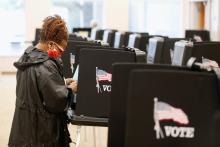
We believe all human beings are made in the “imago dei,” the image and likeness of God — it’s a core tenet of ours and many other faiths. Just as the COVID-19 pandemic has revealed how injustices in our health care and safety net systems stand in stark contrast to that core ideal, so too does any strategy that would negate a people’s votes because of the color of their skin. It is not just a partisan tactic, but rather a denial of their imago dei, a theological, biblical, and spiritual offense to God. Protecting the right to vote affirms the divine imprint and inherent value of all of God’s children.
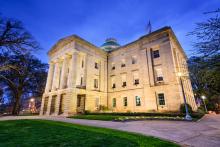
The U.S. Supreme Court has refused to hear an appeal by Republican leaders of a federal court ruling that removed ballot restrictions in North Carolina, due to the restrictions being discriminatory along the basis of race, reports Bloomberg News.
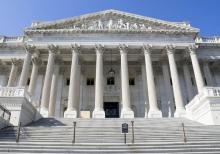
The dismantling of the Voting Rights Act of 1965 by the Supreme Court and conservative state elected officials may be a major reason behind Donald Trump's 2016 U.S. presidential election win, reports ThinkProgress. This was the nation’s first presidential election since the Voting Rights Act's implementation 50 years ago in which the act didn’t provide full protection to voters of color.
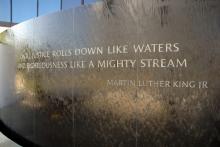
I was born in 1969 and thus am in the first generation of African-Americans to grow up with laws and policies that say to the rest of America that I am equal. I saw housing opportunities open up for me as my parents “broke the block” and became the first African-Americans to move onto an all-white block in the East Mt. Airy section of Philadelphia in 1970. I saw educational opportunities open up such that I was able to attend a nearly all-white private, college-prep high school in the suburbs. This was the fruit of the Civil Rights movement in my life growing up in the 1970s and 80s.
Soon hundreds of thousands will gather on the National Mall to commemorate the 50th anniversary of the March on Washington for Jobs and Freedom where the Rev. Dr. Martin Luther King gave his iconic “I Have a Dream” speech. That speech lived on for me in classrooms and in speech competitions and was etched on my heart so that I would carry that dream into the future.
The recent decisions by the U.S. Supreme Court to gut the enforcement section of the 1965 Voting Rights Act and the decision of the jury in the George Zimmerman trial have left me wondering about the dream, worried that it is under attack and worries that professed Christians are among those helping lead those attacks.
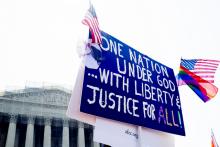
The words above the Supreme Court read, “Equal Justice Under the Law.” This week, two Supreme Court outcomes dramatically affected the reality of those words.
On Tuesday, in a 5-4 decision, a key component of the historic Voting Rights Act of 1965 was struck down, jeopardizing equal justice under the law especially for black, Hispanic, and low-income people whose voting rights have historically been assaulted and have continued to be suppressed as recently as the 2012 election. In fact, Section 4 of the Voting Rights Act — which required parts of the country that have been especially egregious in racially motivated voter suppression to get federal approval of any changes in their voting laws — was specifically used in the 2012 election to prevent new voter suppression. That provision has now been struck down, and efforts to increase barriers to voting are already underway in several states, especially in the South, that would suppress the future votes of Americans of color, especially those with lower incomes.
Equal justice under the law lost on Tuesday, June 25. The Supreme Court’s decision was morally shameful. ...
Contrast Tuesday’s decision with the final ones we saw handed down this week. ... I, along with a growing number of people in the faith community, believe that equal protection under the law is essential for our gay and lesbian friends and family members. While some Christians are conflicted about the theological issues involved, or even are unable to support homosexuality on a religious basis, they also don’t want churches to be the ones standing in the way of civil rights.
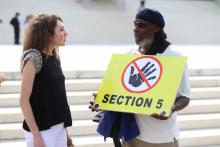
Today is a dark day in our nation’s history. In a 5-4 ruling, the Supreme Court ruled in the case of Shelby County, Alabama v. Holder that Section 4 of the Voting Rights Act is unconstitutional, rendering the 48-year-old legislation impotent to protect citizens from voter suppression. Section 4 lists the states that must obtain “preclearance” from the Department of Justice before instituting changes to their voter laws. In her dissenting opinion, Justice Ruth Bader Ginsburg, said: “Throwing out preclearance when it has worked and is continuing to work to stop discriminatory changes is like throwing away your umbrella in a rainstorm because you are not getting wet.”
Only 48 years ago, on March 7, 1965, men, women, and children absorbed blasts of water, bone-crushing blows from police batons, and profound humiliation as Selma, Ala., police dragged limp black bodies over concrete on the far side of the Edmund Pettus Bridge. They had assembled on that day, which came to be known as “Bloody Sunday,” to march from Selma to Montgomery in protest of voter suppression and intimidation that had plagued the entire South. Ten days later, President Lyndon B. Johnson sent the Voting Rights Act to Congress. The bill passed in the Senate on May 26 by a vote of 77 – 19 and passed in the House on July 9 of that year. President Johnson signed the Act into law with Dr. Martin Luther King, Rosa Parks, and others present on August 6.
Flash forward to Fall 2012. I launched a blog series called “Watch the Vote” because, as of August 2012, 30 states had introduced legislation or enacted laws to hinder voters’ access to voting over the previous year. The Fair Elections Legal Network crafted this map to chart the spread of legal voter suppression initiatives across the nation. Notice, Alabama is one of the states that has recently passed voter restriction law that has not been precleared by the Department of Justice. Its new law, requiring photo ID and proof of citizenship, was set to take effect in 2014 before the Supreme Court ruled last week that Arizona’s voter ID law, which Alabama used as a model for its own, is unconstitutional.
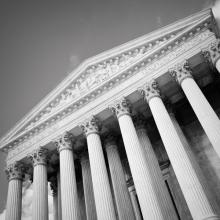
In a 5-4 decision, the Supreme Court today struck down a key section of the Voting Rights Act of 1965 that targeted states with histories of racial discrimination, saying the formula for choosing the states subject to "preclearance" is "based on 40-year-old data." The court's decision states that Congress can revise the formula under which it decides which jurisdictions are subject to oversight:
"Our country has changed, and while any racial discrimination in voting is too much, Congress must ensure that the legislation it passes to remedy that problem speaks to current conditions," the decision reads.
Congress could have updated the coverage formula at that time, but did not do so. Its failure to act leaves us today with no choice but to declare §4(b) unconstitutional. The formula in that section can no longer be used as a basis for subjecting jurisdictions to preclearance. Our decision in no way affects the permanent, nationwide ban on racial discrimination in voting found in §2. We issue no holding on §5 itself, only on the coverage formula. Congress may draft another formula based on current conditions. …
Read the full decision HERE.